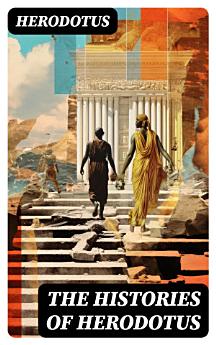The Histories of Herodotus
ធ្នូ 2023 · DigiCat
សៀវភៅអេឡិចត្រូនិច
602
ទំព័រ
family_home
មានសិទ្ធិ
info
reportការវាយតម្លៃ និងមតិវាយតម្លៃមិនត្រូវបានផ្ទៀងផ្ទាត់ទេ ស្វែងយល់បន្ថែម
អំពីសៀវភៅអេឡិចត្រូនិកនេះ
Herodotus's "The Histories" stands as a seminal text in the annals of history and literature, merging anecdotal eyewitness accounts, elaborate descriptions, and an engaging narrative style. Composed in the 5th century BCE, it ventures into the cultural and political landscapes of various societies, from the towering edifices of Egypt to the fervent battles of Greece and Persia. Herodotus employs a sophisticated yet accessible prose that deftly intertwines personal observation with a meticulous chronicle of events, offering not only historical insight but also a meditation on the nature of truth and memory. His work was revolutionary, setting the foundational framework for the discipline of history, and providing a rich tapestry of the ancient world. Herodotus, often called the "Father of History," was himself a traveler and an inquisitive mind, influenced by the complexities of the Persian Wars and the diverse cultures he encountered. Born in Halicarnassus, his explorative journeys through places like Egypt and Babylon imbued him with a deep curiosity about human experience, politics, and war. His intent was not merely to document events but to convey the essence of the human condition, reflecting the political and social ethos of his time. "The Histories of Herodotus" is an essential read for those who seek to understand the interplay of history, culture, and identity in the ancient world. Readers will find rich narratives and unparalleled insights that remain relevant today, inviting them to reflect on the lessons of history and the unfolding story of humanity.
អំពីអ្នកនិពន្ធ
Herodotus, often referred to as 'The Father of History', was an ancient Greek historian who lived from 484 BCE to 425 BCE. This seminal figure was born in Halicarnassus, a Greek city in Asia Minor, in what is modern-day Bodrum, Turkey. His magnum opus, 'The Histories of Herodotus', provides an in-depth narrative of the Greco-Persian Wars and has left a profound impact on the writing and study of history. Herodotus broke from the Homeric tradition of mythological storytelling by investigating and correlating facts, which he gathered through extensive travels to Egypt, Persia, Scythia, and other regions. In his works, he employed a narrative style laced with ethnographic descriptions, anecdotes, and an inquiry into the customs and beliefs of different societies, reflecting a methodological approach that sought to explain historical events in the context of human actions and motivations. However, while his reports incorporated empirical observations, they were not devoid of fanciful elements and unverified accounts, which earned him criticism from later historians such as Thucydides. Nevertheless, his pioneering work laid the foundation for historiography and remains a valuable literary contribution that provides insights into the ancient world (Herodotus, 'The Histories').
វាយតម្លៃសៀវភៅអេឡិចត្រូនិកនេះ
ប្រាប់យើងអំពីការយល់ឃើញរបស់អ្នក។
អានព័ត៌មាន
ទូរសព្ទឆ្លាតវៃ និងថេប្លេត
ដំឡើងកម្មវិធី Google Play Books សម្រាប់ Android និង iPad/iPhone ។ វាធ្វើសមកាលកម្មដោយស្វ័យប្រវត្តិជាមួយគណនីរបស់អ្នក និងអនុញ្ញាតឱ្យអ្នកអានពេលមានអ៊ីនធឺណិត ឬគ្មានអ៊ីនធឺណិតនៅគ្រប់ទីកន្លែង។
កុំព្យូទ័រយួរដៃ និងកុំព្យូទ័រ
អ្នកអាចស្ដាប់សៀវភៅជាសំឡេងដែលបានទិញនៅក្នុង Google Play ដោយប្រើកម្មវិធីរុករកតាមអ៊ីនធឺណិតក្នុងកុំព្យូទ័ររបស់អ្នក។
eReaders និងឧបករណ៍ផ្សេងទៀត
ដើម្បីអាននៅលើឧបករណ៍ e-ink ដូចជាឧបករណ៍អានសៀវភៅអេឡិចត្រូនិក Kobo អ្នកនឹងត្រូវទាញយកឯកសារ ហើយផ្ទេរវាទៅឧបករណ៍របស់អ្នក។ សូមអនុវត្តតាមការណែនាំលម្អិតរបស់មជ្ឈមណ្ឌលជំនួយ ដើម្បីផ្ទេរឯកសារទៅឧបករណ៍អានសៀវភៅអេឡិចត្រូនិកដែលស្គាល់។








